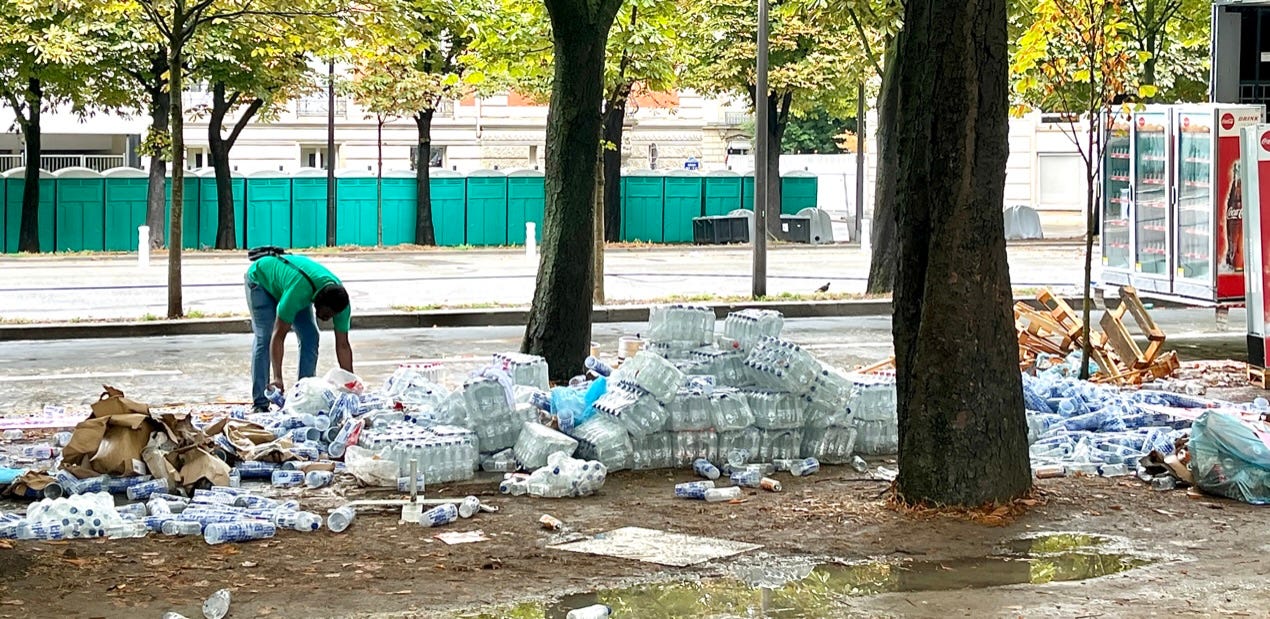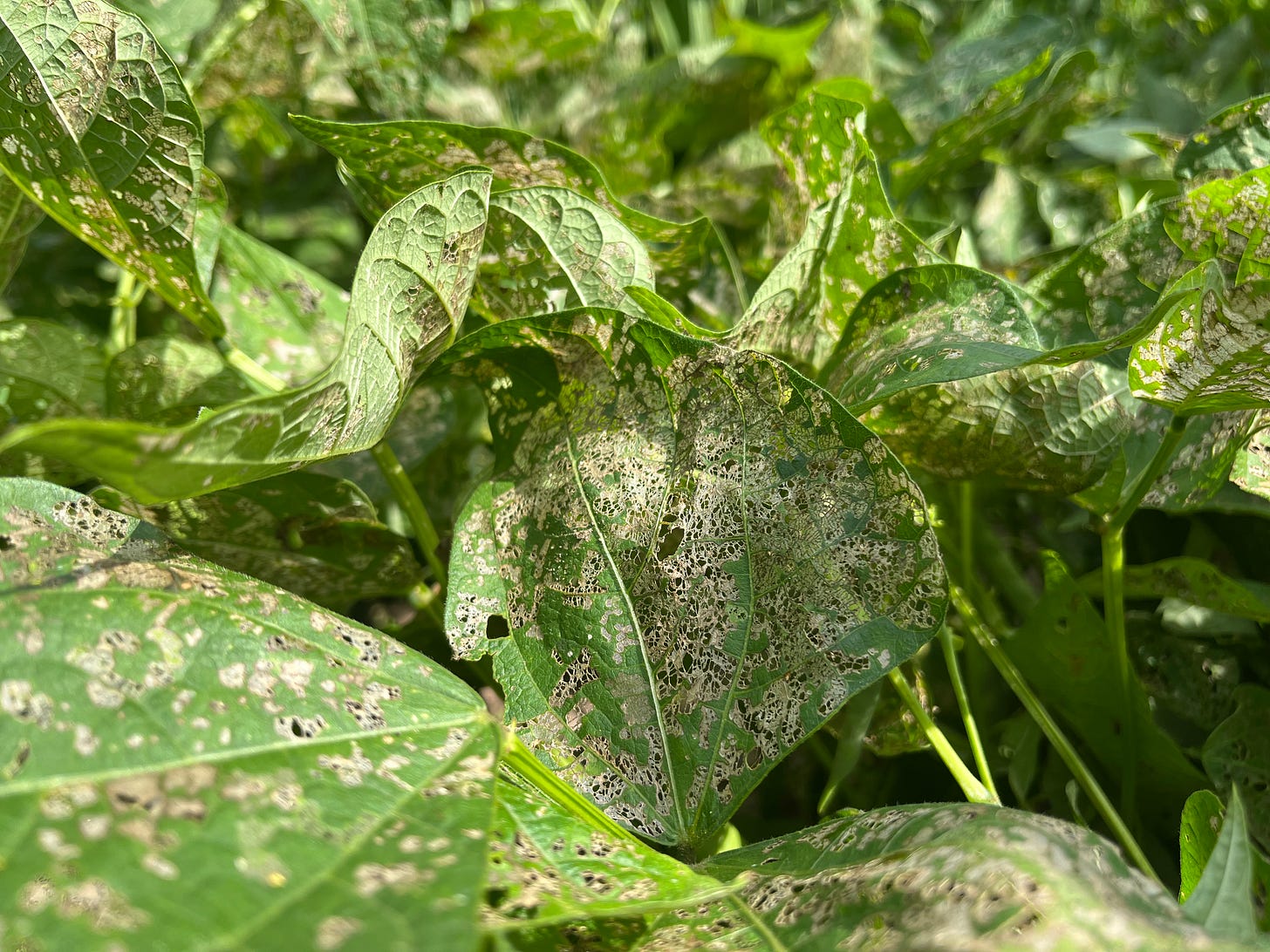Wasteland
Some fragmented thoughts on trash, community, invisible labor, bean beetles, the beautiful futility of gardening—and a blessing for those walking through valleys
Monday, August 19
Grand Rapids, Mich.
An image is stuck in my mind from our trip to Paris for the Olympics, and it’s not one of triumph over tragedy, or a glorious victor atop a medal podium, or the crowds cheering with abandon.
As we walked along the Seine on the morning after the rain-drenched opening ceremony, all we saw around us were puddles and trash—piles and piles and piles of trash. Workers were everywhere, painstakingly dismantling the temporary spectator stands, removing signage, and picking up each piece of paper, every empty plastic bottle, every shard of glass, on the ground.
The other night, I was working my way through some old issues of The New Yorker—I never manage to get through it the week it comes—and I read a fascinating profile of New York City’s sanitation commissioner. New Yorkers produce twenty-four million pounds of waste per day. Most of it is spirited away to landfills or incinerators in other states, but it takes an army of sanitation workers (New York has 8,000), truck drivers, tugboat operators, and other laborers to make that happen.
Then, this past weekend, as I was heading to North Carolina to preach, I came off the airplane onto the jet bridge, and I saw eight cleaners, wearing gloves and carrying caddies packed with supplies, ready to tidy up after the passengers. I fly a lot, but I’d never seen the cleaners waiting on the jet bridge before. I tried to catch the eye of one, then another, hoping at least to thank them with a smile. Every single one had their gaze down, looking toward the ground.
I’ve been sitting with the reality that so much of our modern life, so much of our culture of convenience and entertainment, relies on others to pick up after us. There was a particularly striking line late in the New Yorker profile of Jessica Tisch, the sanitation commissioner. Her job, she says, is to make trash “not omnipresent. Make it go away. Make it so that people who are using the streets don’t see it at all hours of the day.” Which is wonderful—yay for clean streets!—but do we then also choose to see the people who make that happen?
To be clear, this isn’t just about trash. Every single part of our lives is a labor of community. Those of us who aren’t farmers rely heavily not just on those who grew our food and those who harvested it, but also those who packaged it and those who put it out on the supermarket shelves. When I got to church on Sunday morning, the chairs were all neatly arranged in the auditorium—volunteers had done it before I arrived—on a floor that had been swept and mopped by the custodial staff, and other volunteers were setting out the morning coffee. And I’ve never given much thought even to how the lights stay on: Who produced all the wiring? Who installed it? Who keeps the electric plant going? Where does the fuel come from?
I suppose I’m reckoning with the lie of self-sufficiency and rebuking once again the charade of independence. Our lives and labors are ridiculously intertwined. Are we willing to notice it? Will we choose to see that truth—and not just the fact of it but also the embodied reality behind it? Might I muster just a little gratitude for what I usually take for granted?
This morning, as I passed through the security checkpoint at Raleigh-Durham Airport, I threw my bags into the bins, and a pair of gloved hands gently ushered them on their way. I stopped and looked up at the woman to whom those hands belonged. “Good morning,” I said. “Thank you.”
The TSA agent seemed startled. But she lifted her eyes to meet mine, and her face quickly melted into a warm smile. “You’re welcome,” she said. “You have a wonderful day now.”
What I’m Growing: I think I’m losing my battle with the bean beetles. My trip last month was a vacation for them—respite from my murderous fingers. Ever since I got back, every visit to the garden has been a squishing expedition, and today was especially gruesome. I stopped counting at 200 beetles killed.
So many leaves of the bean plants have been chewed into lacework. Yet I have to admire the plants. They just keep producing more leaves and more blossoms. They just keep doing what they were designed to do. But then so do the beetles.
Why do we even try?
Chanequa Walker-Barnes, in her always thoughtful newsletter, “No Trifling Matter,” has a lovely essay this week on her attempts to grow things. “The thing is, even when we garden, we’re not good at it,” she writes. “For most of the five or six years that we’ve tried, our efforts have resulted in an almost null harvest: perhaps a handful of green beans or okra (not enough to make a meal), a head of lettuce, sunburned basil and cilantro gone to seed from lack of attention. There was one year that we managed to grow enough tomatoes for the squirrels to leave some for us. Another when the cucumber and pepper harvest allowed for canning. Mostly, though, we are successful with growing weeds. Those we have in abundance.”
Why do we even try?
I’m not a particularly good or attentive gardener. The potatoes are doing very well this season—and for those of you who don’t identify as skilled gardeners, I heartily recommend potatoes, which, for me at least, seem to do just fine despite my neglect. We have plenty of tomatoes, though they are nowhere near as prolific as those of my neighbors in the community garden. My zinnias and cosmos look splendid, as long as I don’t compare them with the riot of blossoms in the neighboring plots.
But though I planted both acorn and delicata squash, it doesn’t look like I’ll harvest any. Those ranunculus bulbs? Not a single flower. I thought I sowed an entire row of spinach, but now I’m doubting myself, because I didn’t manage to harvest any.
Why do we even try?
Each of us will find our own personal answers to that question if we ask it earnestly.
For Walker-Barnes, it’s partly for the sake of memory, particularly of her grandfather and of “the miracle in the peppers and beans grown from tiny seeds in a backyard belonging to a man who had grown up on a Mississippi farm where his sharecropping parents had barely even belonged to themselves.” It’s also an act of redemption: “Maybe, though, it’s not the failure that matters, but the attempt,” she writes. “Because every year that we till and weed the soil, planting the seeds and seedlings in their rows, and label the garden stakes, I have some hope that I am recovering what trauma, illness, and death stole from us—the love of the land, the wisdom of my ancestors, the connection to creation.”
Reading her words, I thought of my grandmother. She never owned any land. But on the balcony of her apartment, she always had plants—houseleeks, which are sometimes called hens and chickens; jade plants; and, most cherished of all, the tan fa, that regal queen of the night, which every couple of years, would unfurl a single night-blooming flower that faded before dawn.
My grandmother was the one who taught me to save the nubby ends of green onions and stick them into whatever soil I could find, so that new ones might grow. Thrifty, of course, and also a mini-lesson in the possibility of new life coming from something you might usually deem worthless.
In the raised bed in our yard, I have a few green onions, grown not from seed but from the remnants of some I bought, just as my grandmother taught me. I think I’ll make some fried rice later this week. I’ll remember—and then I’ll head back to the garden to kill more beetles.
I’ve been in a bit of a valley lately, and I can’t pinpoint exactly why.
Sometimes, when I’m in these spells, I tell myself that it is right and good: Wallowing has long been one of my personal spiritual gifts and it’s nice to be reminded occasionally of what you know how to do well. Plus, “wallow” is just such a great word; pleasing to the eye, structurally elegant.
There comes a point, though, when I begin to annoy even myself. I’ve already played Wordle and Connections and Spelling Bee on my phone. I’ve dragged myself to the community garden, harvesting potatoes and tomatoes, and planting lettuce and chard for the fall. I escape to the kitchen, too, but sometimes even I can’t cook and eat my way out of the funk.
I’ve been checking in with friends—and, whether near or far, almost every single person is carrying so much: Strained relationships. Diagnoses known or feared. Worries about the kids. Rough stretches at the office. The pure exhaustion of keeping a household mostly functioning and a life relatively intact.
Little of this shows up on social media, which is right and good too. There are so many layers beneath the sunny vacation photos and the smile-filled snapshots of celebrations. Some people might say that this renders those images inauthentic, but I see wisdom in the choice to reserve some stories for those inner circles of trust.
If this is you, in whole or in part, here’s a blessing. I hope it helps.
Life can be so lonely. Life can feel so hard.
May you know the deep respite of companionship. May you sense the immense
relief of ease.
Some days are little more than a long trudge through an endless valley.
May you find a shady spot in which to rest.
Some nights vibrate with worry, anxieties ricocheting through your brain.
May you fall into the soundest slumber, with only the sweetest of dreams.
People ask, “What’s wrong?” There’s no good answer, or none that you wish to share.
May you know the comfort of silent solidarity and the care of those who need no
details.
You wish it made sense—whatever “it” might be—but sometimes it just doesn’t.
May you encounter peace in holy unknowing, and may you feel loved through it all.
That’s it for this installment. I know I’ve been a little inconsistent in my correspondence. I’m sorry. I hope to do better in the coming weeks.
What’s on your hearts and minds?
With you and for you,
Jeff






Deep thanks for speaking into my wallowing. I will be reading this over and over when I’m out of whack. You’ve supplied a bit of grace, and peace.
Thank you for sharing that beautiful blessing. Hopefully we're all on a trail leading away from the funk too many of us seem to be in. Peace and love to you.